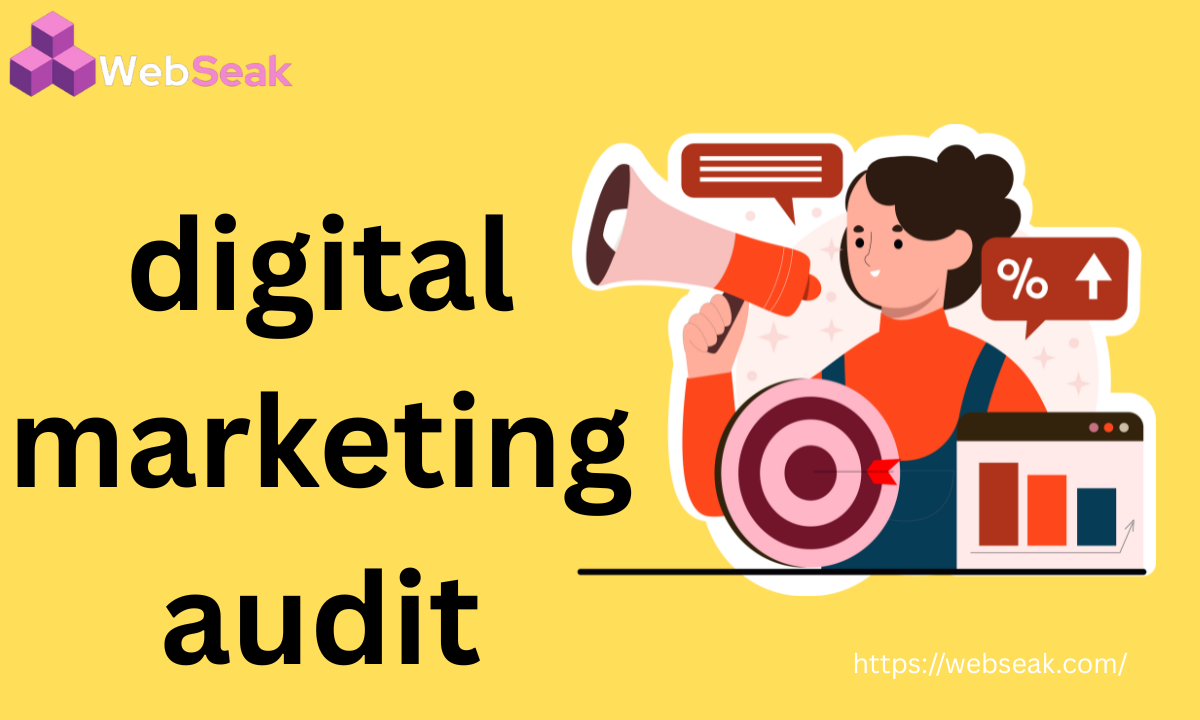
Introduction
A digital marketing audit is a comprehensive analysis of all your online marketing efforts to identify what’s working, what’s not, and where improvements can be made. At Webseak we believe that regular audits are essential for maintaining strong digital performance. A well-executed audit gives businesses a clear picture of their marketing health and helps refine strategies for better results.
In this article, we’ll break down everything you need to know about a digital marketing audit — its meaning, purpose, steps, and benefits. Whether you’re running campaigns for a small business or managing a large organization’s online presence, a proper audit can uncover valuable insights to boost visibility, engagement, and conversions.
Table of Contents
What Is a Digital Marketing Audit ?
A digital marketing audit is a detailed examination of your company’s digital presence across all online platforms. It evaluates the performance of your website, SEO, social media, content marketing, paid advertising, and overall brand visibility.
The main goal of a digital marketing audit is to understand how effectively your digital channels are performing and to uncover opportunities for improvement. It helps identify gaps in strategy, technical issues, or missed opportunities that may be affecting your overall growth.
Simply put, it’s like a health check-up for your marketing efforts — ensuring everything is optimized, consistent, and aligned with your business goals.
Importance of a Digital Marketing Audit
The importance of a digital marketing audit lies in its ability to provide clarity and direction. Many businesses spend heavily on marketing but struggle to see results because they don’t know what’s holding them back. An audit identifies these weak spots and offers actionable recommendations.
Here’s why it’s essential:
- Identifies inefficiencies: Finds what’s wasting time or budget.
- Measures ROI: Tracks which campaigns or channels deliver the best results.
- Improves targeting: Reveals how effectively you’re reaching your audience.
- Enhances brand consistency: Ensures all platforms communicate a unified brand message.
- Supports future strategy: Provides a data-backed foundation for new campaigns.
Without an audit, it’s difficult to know if your marketing efforts are truly working or if you’re missing critical opportunities.
Key Components of a Digital Marketing Audit
A complete digital marketing audit examines every aspect of your online presence. Here are the main components involved.
1. Website Performance Audit
Your website is often the first impression customers have of your business. The audit evaluates:
- Page loading speed
- Mobile responsiveness
- User experience and navigation
- On-page SEO and keyword usage
- Technical issues such as broken links or missing meta tags
A slow or confusing website can drive potential customers away, so optimizing it is essential.
2. SEO Audit
The SEO audit focuses on how well your website ranks on search engines. It examines:
- Keyword optimization and content relevance
- Backlink profile quality
- Internal linking structure
- Technical SEO (crawlability and indexing)
- Local SEO performance
This helps identify opportunities to boost organic traffic and improve visibility.
3. Content Marketing Audit
Content drives engagement and builds authority. A content audit checks:
- Quality and relevance of blog posts, videos, and landing pages
- Keyword alignment and readability
- Content gaps compared to competitors
- Engagement metrics such as time on page and shares
It ensures your content effectively supports both SEO and user intent.
4. Social Media Audit
Your social media channels reflect your brand personality. This part of the audit reviews:
- Engagement rates (likes, comments, shares)
- Consistency of posting and branding
- Audience growth and demographics
- Performance of paid social campaigns
A social media audit reveals which platforms drive the most engagement and which need improvement.
5. Paid Advertising Audit
Paid ads can deliver instant results but only when managed effectively. This audit examines:
- Ad performance and ROI
- Targeting and bidding strategy
- Ad copy and creative quality
- Conversion tracking accuracy
The goal is to identify ways to lower costs while improving results.
6. Email Marketing Audit
Email remains a powerful marketing tool. This audit looks at:
- Open and click-through rates
- Segmentation and personalization
- Subject line performance
- Automation workflows
By analyzing these elements, businesses can increase engagement and customer retention.
7. Competitor Analysis
Understanding what your competitors are doing helps you stay ahead. The audit compares:
- Their SEO rankings and keywords
- Ad strategies and creatives
- Content performance
- Social media presence
This insight helps refine your own marketing strategy.
Steps to Conduct a Digital Marketing Audit
At Webseak, our audit process is structured, data-driven, and tailored to each client’s business goals.
Step 1: Define Objectives
Before starting, identify what you want to achieve — higher traffic, better conversions, or stronger brand awareness.
Step 2: Collect Data
Gather analytics from tools like Google Analytics, Google Search Console, SEMrush, and social media insights.
Step 3: Analyze Performance
Evaluate how each channel performs based on KPIs such as clicks, leads, engagement, and ROI.
Step 4: Identify Strengths and Weaknesses
Highlight what’s working well and pinpoint areas that need improvement.
Step 5: Develop Recommendations
Create actionable steps to optimize each marketing channel.
Step 6: Implement and Monitor
Apply the changes and track performance regularly to measure progress.
Benefits of a Digital Marketing Audit
Performing a digital marketing audit offers multiple benefits that can directly impact business performance.
1. Increased ROI
By eliminating waste and focusing on high-performing strategies, you can achieve better returns on marketing investment.
2. Better Customer Understanding
The audit provides insights into customer behavior, helping you create more personalized and effective campaigns.
3. Stronger Online Visibility
Optimizing SEO, content, and ads boosts your reach across search engines and social platforms.
4. Competitive Advantage
Analyzing competitors helps identify gaps in your strategy that you can capitalize on.
5. Improved Conversion Rates
By enhancing website performance and targeting, you can convert more visitors into paying customers.
6. Long-Term Growth
A digital marketing audit sets the foundation for sustainable success by aligning all marketing activities with business goals.
Tools Used for Digital Marketing Audits
Several tools help make the audit process more efficient and accurate:
- Google Analytics for website and traffic insights
- Google Search Console for keyword and indexing performance
- SEMrush or Ahrefs for SEO and backlink analysis
- Hootsuite for social media analytics
- Mailchimp for email campaign reporting
- Google Data Studio for visualizing audit results
Using these tools ensures your findings are data-backed and reliable.
How Often Should You Perform a Digital Marketing Audit ?
At Webseak we recommend conducting a digital marketing audit at least once or twice a year. However, for businesses running frequent campaigns, quarterly audits are ideal. Regular audits help keep your marketing strategies up to date with evolving algorithms, market trends, and consumer behavior.
Future of Digital Marketing Audits
The future of digital marketing audits is becoming more data-driven and automated. Artificial intelligence and predictive analytics will soon play a larger role in analyzing patterns, forecasting performance, and suggesting improvements.
As privacy regulations tighten and consumer behavior changes, audits will also focus more on ethical marketing practices, data security, and customer experience. Businesses that continue to refine their strategies through regular audits will stay ahead in the digital race.
Conclusion
A digital marketing audit is the foundation of a successful online strategy. It provides a clear understanding of your marketing strengths, weaknesses, and opportunities for growth. From SEO and content marketing to paid ads and social media, a thorough audit helps optimize every aspect of your digital presence.
At Webseak we believe that consistent auditing and data-driven insights lead to smarter decisions and sustainable business growth. If your digital marketing efforts aren’t delivering the results you expect, a comprehensive digital marketing audit may be the key to unlocking your brand’s full potential.


